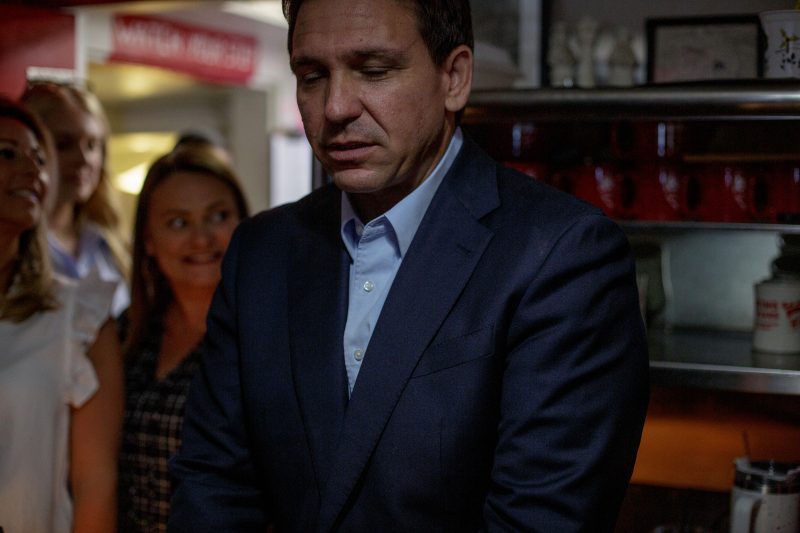As is so often the case, it was the paperwork that made it official. On Wednesday, Florida Gov. Ron DeSantis filed the requisite form to enter the field for the Republican Party’s 2024 presidential nomination.
In doing so, he immediately vaults into a robust lead over most of the declared candidates. But in politics, as in a cattle auction, second place doesn’t do you much good.
FiveThirtyEight’s running average of Republican primary polls shows the unpleasant state of the contest for DeSantis. Since March, when former president Donald Trump led DeSantis 45 percent to 30 percent, Trump has consistently peeled away support from his rival.
In the first week of March, Trump and DeSantis combined for an average of 74.7 percent of the vote in the polling average. In the most recent seven-day period, they combined for 74.3 percent. The difference is that Trump now has five supporters for every two that DeSantis has.
Trump’s level of support is well above where he was at the end of the 2016 presidential nominating contest. That year, he got about 45 percent of the total votes cast in the primaries, a function of his sharing the pool with other strong candidates. But it was enough to secure the nomination, in part because the GOP primary system disproportionately rewards the front-runner by design.
Now — well in advance of voting, certainly — Trump is outpacing his final 2016 support percentage by nearly 10 points.
It’s not that DeSantis isn’t popular. It’s just that Republicans prefer Trump.
New polling from CNN, conducted by SSRS, shows what that looks like. Trump is the first choice of 53 percent of likely primary voters, double the level of support for DeSantis. Add in the percentage of primary voters who view each candidate as their second choice, and you see DeSantis’s problem: More primary voters pick him as their No. 2 candidate than as their No. 1.
CNN also asked respondents whether they would refuse to support a candidate. Overall, only 16 percent said they would not support Trump, about the same percentage that said that of DeSantis. Among those planning to vote for Trump, 13 percent said they wouldn’t vote for DeSantis. Compare that with the numbers for former vice president Mike Pence. Overall, 45 percent of primary voters said they wouldn’t consider him. Among Trump supporters, 54 percent said they wouldn’t support Pence, who has not declared his candidacy.
Polling conducted for the Economist by YouGov shows how similarly Trump and DeSantis are viewed by Republicans. Each is viewed positively — but more than half of Republicans view Trump very favorably, while less than half say the same of DeSantis. Of those who have an opinion of DeSantis (10 percent of Republicans don’t), his numbers mirror Trump’s.
The same pattern emerges when respondents were asked about each candidate’s ideology. Trump is more likely to be seen as liberal or moderate … somehow. But about the same percentage of Republicans see Trump and DeSantis as very conservative.
Trump fares worse with independents who plan to vote in the primary than he does with Republicans in CNN’s poll. But the support he sheds goes not to DeSantis and instead to former South Carolina governor Nikki Haley.
Haley, anticipating DeSantis’s entry into the race on Wednesday, released an ad drawing an explicit comparison between DeSantis and Trump. She characterizes DeSantis the way many voters seem to see him: as another version of the former president.
Setting aside the utility of Haley targeting the No. 2 candidate instead of the guy in the lead, it’s a valid question: Can DeSantis emerge as something other than a backup Trump?
The argument DeSantis has been making to differentiate himself from Trump centers on the former president’s general election problems. He lost the popular vote in 2016, contributed to a Democratic rout in 2018, lost the 2020 presidential election and then helped boost candidates who enable the opposition to retain a majority in the Senate in 2022.
But Republicans, as respondents to YouGov’s poll in general, still think Trump has a better chance of winning in 2024. It’s about a 2-to-1 margin, in fact, in line with support for each of the two leading candidates in YouGov’s head-to-head poll question.
Wednesday is Day 1 of DeSantis’s campaign (although he obviously has been running for months now). Voting doesn’t start for nearly eight months. He has time to distance himself from Trump. That’s not the question.
The question, instead, is if he has the ability to do so.








